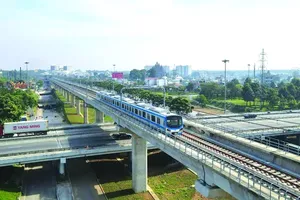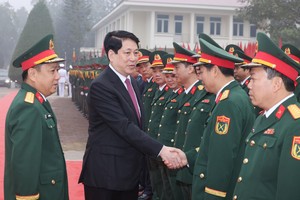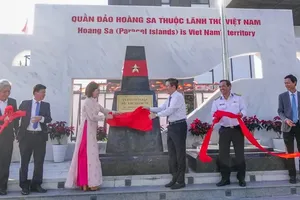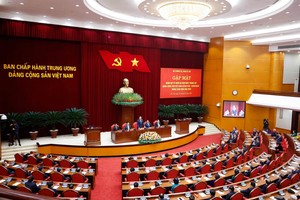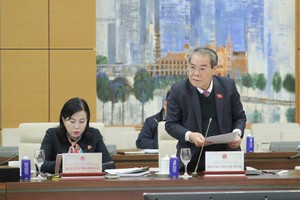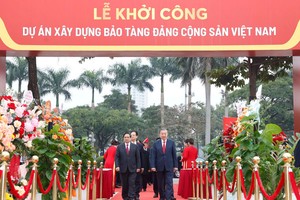
In a significant move to enhance transparency and efficiency in civil service evaluations, Ho Chi Minh City has implemented a comprehensive set of tools to measure and assess the performance and work efficiency of cadres, civil servants, and public employees. This initiative, centered on KPIs tailored to specific job positions, aims to eliminate subjective and emotional biases, ensuring a fair and objective evaluation process.
The adoption of this KPI-based system marks a pivotal step forward in transforming the perception and methodology of performance assessments. By focusing on measurable outcomes and job-specific metrics, the city seeks to elevate the quality of its civil service workforce to meet the increasingly demanding standards of public administration in the modern era. This reform underscores Ho Chi Minh City’s commitment to fostering a professional, accountable, and high-performing team of civil servants to serve its citizens effectively.
The Government has recently submitted a draft amendment to the Law on Cadres and Civil Servants to the National Assembly. The proposed changes include evaluating civil servants based on job-specific outcomes and performance, their ability to meet job requirements, and adherence to civil service ethics.
The drafting body is currently refining the draft, aiming to institutionalize these principles across the system. A key objective is to recognize and treat talented individuals as a distinct and prioritized category within the civil service framework.
Minister of Home Affairs Pham Thi Thanh Tra emphasized that civil servants must meet the demands of their roles to thrive in today’s public sector. Speaking on the importance of performance evaluations, she described the process as a critical mechanism for assessing the capabilities of cadres, civil servants, and public employees. According to Minister Pham Thi Thanh Tra, evaluation is not just a routine; it is a strategic tool to identify, train, nurture, and retain talent within the civil service.
By implementing thorough and objective assessments, the Ministry aims to build a competent, professional workforce capable of meeting the evolving challenges of public administration while fostering a culture of excellence and accountability.
Director Nguyen Quang Dung of the Department of Civil Servants and Public Employees under the Ministry of Home Affairs recognized that the current assessment of civil servants and public employees tends to be largely superficial, with most being categorized as "performing their duties well". As a result, the implementation of Key Performance Indicators is viewed as a means to quantify work performance and assess efficiency.
Khanh Hoa and Hau Giang provinces lead the way in KPI-based civil service evaluations. The use of Key Performance Indicators in Vietnam’s public sector is gaining traction, with provinces like Khanh Hoa and Hau Giang pioneering structured evaluation systems to assess the performance of civil servants and public employees. These localities have developed comprehensive regulations outlining criteria for evaluating and classifying the quality of their workforce, marking a significant step toward modernizing public administration.
In Khanh Hoa province, government agencies, organizations, and units have fully implemented KPI systems across all civil servants and public employees. The evaluation process is tailored to the complexity of roles, with distinct assessment levels for professional and technical groups. To ensure accuracy and transparency, agencies have adopted specialized software that calculates KPI scores, which are then converted into performance ratings for assigned duties and tasks. This data-driven approach enhances objectivity, streamlines evaluations, and aligns individual performance with organizational goals, setting a model for other regions to follow.
Secretary Nghiem Xuan Thanh of the Khanh Hoa Provincial Party Committee affirmed that the KPI system has instilled a spirit of self-awareness and responsibility among civil servants, fostering a strong sense of emulation and enthusiasm in their work. Prior to his current role, Mr. Thanh implemented KPI evaluations for employees while working in the private sector, yielding positive results.
In 2021, he continued to develop and apply KPI metrics for civil servants during his tenure in Hau Giang province. When assuming the position of Khanh Hoa Provincial Party Committee Secretary, he extended the use of KPI to assess work efficiency across the entire provincial civil service, effective April 1, 2025.
After nearly two months of implementation, the KPI toolkit has proven to be objective, transparent, and effective in accurately reflecting actual work outcomes. By evaluating work products based on quantity, quality, and completion efficiency, the system enables precise scoring at the individual, departmental, and agency levels.
This approach supports the identification of necessary job positions based on work complexity—from simple to advanced—and facilitates the scientific determination of staffing needs across departments, agencies, and localities. The result is a more accurate and optimized allocation of human resources.
KPI data also provides clear insights into daily work hours and performance levels for each official and civil servant, forming a foundation for rational staffing adjustments. Moreover, KPI results serve as a critical basis for annual performance evaluations, staff classification, and personnel decisions. They inform salary structures, bonus distribution, training plans, and knowledge updates for those not meeting role requirements.
Eliminating outdated mindsets
Some enterprises in Binh Dinh province have also applied KPI to evaluate the work efficiency of employees. Deputy Director Nguyen Dinh Thanh of the Investment Promotion Center under the Department of Finance of Binh Dinh informed that from the effectiveness of applying KPI in the private sector, the unit is researching and advising the Provincial People's Committee to apply KPI in governments in districts.
Applying KPI will create scientific and accurate assessment results for each employee. At that time, KPI will not only create better work efficiency, but also help localities have a scientific and transparent basis to consider transferring, streamlining, and considering job arrangements for employees.
Former Deputy Minister of Home Affairs Nguyen Tien Dinh emphasized the importance of evaluating civil servants and public employees based on their specific job positions, with clear identification of both roles and responsibilities. He noted that while organizations and agencies are currently assessed using general indicators—such as the Public Administration Reform Index (PAR Index) and the 2024 People's Satisfaction Index (SIPAS)—there are no corresponding evaluation tools for individuals.
The Ministry of Home Affairs' proposal to implement KPIs for assessing civil servants and public employees is a step toward addressing this gap. By focusing on individual performance, the approach aims to deliver a more accurate, substantive, and objective evaluation of civil service work.
According to Chairman Phung Quoc Viet of the People's Committee of Vinh Loc A Commune of HCMC's Binh Chanh outlying district, the effective implementation of Key Performance Indicators in the public sector can enhance the selection process for competent civil servants and public employees. It also provides a clear framework for identifying and removing underperforming individuals from the system.
As the transition to a two-tier local government structure progresses, commune-level administrations will take on a significant portion of responsibilities currently managed at the district level. Consequently, decentralization and delegation of authority to the commune level will expand across nearly all sectors. Applying KPI metrics to specific, quantifiable job positions will greatly improve efficiency, fostering greater accountability and awareness among civil servants and public employees.
However, commune-level officials often handle numerous unclassified tasks—duties not explicitly outlined in job descriptions. As a result, KPI implementation may not fully capture the scope of their work. To address this, it is essential to develop and integrate more flexible evaluation criteria that consider grassroots-level tasks, ensuring a comprehensive and objective assessment of performance.


